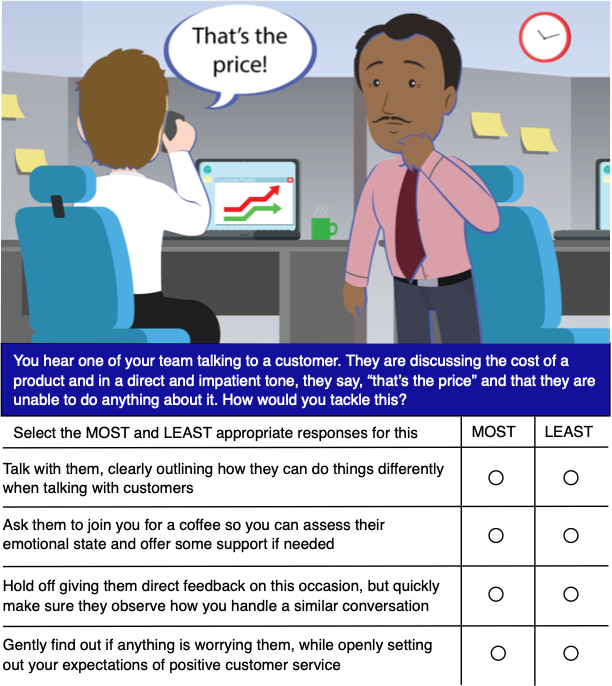Manager SJT
Call or email to discuss our tests or to book a demonstration of our platform +44 (0)7872 019525 or support@viewpoint-psychology.com
What do Situational Judgement Tests assess?
A Situational Judgement Test or SJT is a type of psychometric test that presents candidates with real-life work situations and then asks them to decide on the best response to that situation. The Manager SJT is a situational judgement test that is specifically geared towards situations that someone in a leadership or managerial role may encounter across different industries.
Typical roles that would use our Manager SJT are:
1. Leaders
2. Managers
3. Supervisors
Overview of the Manager SJT
Our Manager SJT presents candidates with 20 distinct situations that many supervisors, managers, and leaders might find familiar across a variety of organisations. For each situation, 4 possible responses are given, each presenting a feasible response someone in a role may take. Candidates are asked to review these responses and select 1 response they consider to be ‘ most appropriate’ and another they think would be the ‘least appropriate’. As with all our SJTs, the Manager SJT is untimed but typically takes up to 15 minutes to complete.
Our SJT measures 4 competencies / behaviours:
1. Inspiring Leadership: Maximising the aspirations and commitment of others.
2. Business Vision: Gathering sufficient information in order to make valid decisions.
3. Business Management: Maximising the performance of others in the business.
4. Professional Integrity: Demonstrating a genuine commitment to company standards and priorities.
Example Manager SJT Question

Manager SJT - Sample Reports
On completion of the Manager SJT, you can download 2 reports as standard:
1. Recruitment Report, where the content is designed for an organisation and supports a recruitment decision. This report provides tests scores, behavioural interpretation and interview questions.
2. Candidate Report, where the content is designed for a candidate(s) and provides feedback on the test performance. This report provides behavioural interpretation and suggests development goals for improving their competencies.
Free Tests!
Take a free test. On completion you will be able to download a detailed report based on your results. We will not ask you for any personal information to be able to view your report.
Take a free Critical Reasoning Test
How to do well in your Manager SJT
To do well in a Manager SJT, it is good to implement the following tips...
1. Leadership and Decision-Making: For managers, demonstrating strong leadership and decisive decision-making is key. In SJT scenarios, choose responses that showcase your ability to lead by example, make informed decisions quickly, and effectively manage resources and teams. Emphasize your competency in guiding teams towards achieving organizational goals.
2. Conflict Resolution and Interpersonal Skills: Effective conflict resolution and strong interpersonal skills are essential for managers. In the SJT, look for options that demonstrate your skill in resolving disagreements, facilitating open communication, and maintaining positive team dynamics. Highlight your ability to address issues diplomatically and foster a collaborative work environment.
3. Strategic Thinking and Innovation: Managers are often required to think strategically and drive innovation. When faced with SJT scenarios, select responses that reflect your capacity for long-term strategic planning, the ability to identify opportunities for improvement, and the skill to implement innovative solutions that align with the organization's vision and objectives.
Remember, each SJT is unique, so it's crucial to read and understand each scenario carefully before responding. Practice and familiarity with the investment banking context will be key to your success.
